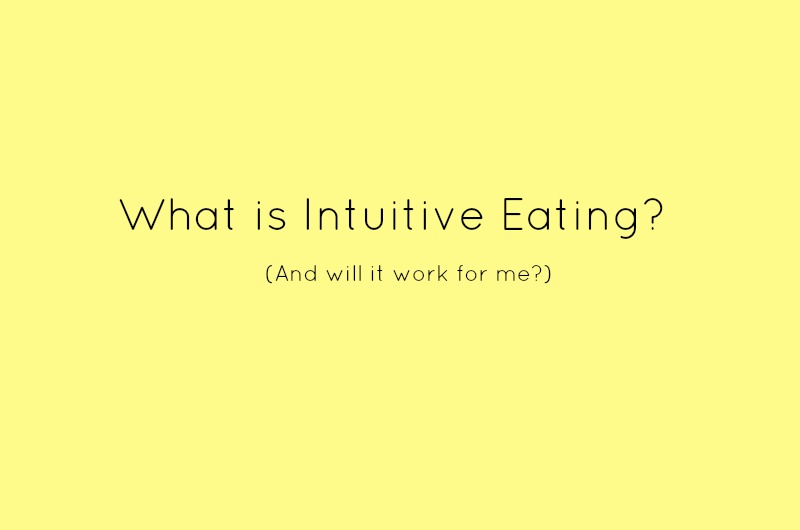
Registered dietitian Megan Metropulos breaks down what intuitive eating is and how she uses it with her clients to help them break free from yo-yo dieting.
Have you heard about Intuitive Eating? If you’re tired of feeling stuck in an endless cycle of dieting and bingeing, intuitive eating might be for you. I utilize the principles of intuitive eating when working with many of my clients, and I’m working towards becoming a Certified Intuitive Eating Counselor.
The Intuitive Eating approach was developed by a pair of dietitians, Evelyn Tribole and Elyse Resch. It’s supported by research and based on the following ten principles:
1. Reject the diet mentality
2. Honor hunger
3. Make peace with food
4. Challenge the food police
5. Feel your fullness
6. Discover the satisfaction factor
7. Cope with emotions without using food
8. Respect your body
9. Feel the difference with intuitive exercise
10. Honor your health with gentle nutrition
In a series of blog posts, I’ll go through and expand a little more on the principles. For today, I’ll give you a brief overview of intuitive eating, and then we’ll focus on rejecting the diet mentality and honoring your hunger.
A little overview…
We’re all born intuitive eaters. Think about babies and toddlers. They cry when they’re hungry, and stop eating once they’re satisfied. Some days they might be hungrier than others, and they don’t always get hungry at the same times every day.
 As we get older, many of us move away from eating intuitively. Emotions, outside influences (friends, family, the media, etc.), and busy lifestyles start to affect our eating habits. That’s not to say there’s anything inherently bad about eating for emotional reasons. In fact, food is highly tied to many emotional experiences (think holidays, celebrating milestones, etc.). It becomes problematic when we use food to cope with (or avoid) uncomfortable emotions. We all do it at times, and coming to terms with that (i.e. losing the guilt associated with it) is actually part of intuitive eating. Becoming an intuitive eater will help you identify what is triggering the desire to eat when you’re not hungry (or keep eating once you’re full), and determine what it is you really need.
As we get older, many of us move away from eating intuitively. Emotions, outside influences (friends, family, the media, etc.), and busy lifestyles start to affect our eating habits. That’s not to say there’s anything inherently bad about eating for emotional reasons. In fact, food is highly tied to many emotional experiences (think holidays, celebrating milestones, etc.). It becomes problematic when we use food to cope with (or avoid) uncomfortable emotions. We all do it at times, and coming to terms with that (i.e. losing the guilt associated with it) is actually part of intuitive eating. Becoming an intuitive eater will help you identify what is triggering the desire to eat when you’re not hungry (or keep eating once you’re full), and determine what it is you really need.
For me, a big take away from intuitive eating is that we need to be kind to our bodies, and learn what it means to nourish our whole selves. There are no good vs bad foods. We shouldn’t feel guilty or ashamed for what or how much we eat. We should be curious about what influences our food choices, and what we are truly hungry for.
It can be tough not to turn intuitive eating into another diet. One of the hardest parts is that you have to put weight loss goals on the back burner. Yes, you read that right. Sometimes weight loss happens as a result of intuitive eating, but it may not. What you will work towards is a healthier relationship with your body, which often turns into taking better care of yourself (physically, mentally, and emotionally). Think about all the times dieting has interfered with your life. Has it really gotten you to where you want to be?
Some studies have shown that in the long run, many people who diet end up gaining more weight than they lost. Other studies have taught us that yo-yo dieting can be particularly harmful to physical and emotional health.
Another difficult concept is giving yourself unconditional permission to eat. That can be very scary for many people, especially those who have a history of restricted eating or binge eating.
Intuitive eating also takes patience. Becoming an intuitive eater won’t happen overnight, and you will constantly be learning from experiences along the way. If you have an occasion where you eat to the point of feeling stuffed, intuitive eating teaches you to be curious about why. Instead of feeling guilty, you learn from the experience and move on.
Rejecting the diet mentality and honoring your hunger:
What is diet mentality? It’s that little voice inside your head that says “you don’t deserve this cupcake because you didn’t work out today” or “choose the salad because your sister’s wedding is in two weeks.”
Honoring your hunger means trusting your body to let you know when it needs fuel. Hunger is not the enemy. It’s actually awesome, because it means your metabolism is working the way it should!
Have you ever had a day where you ate a balanced breakfast at 8AM, but by 10AM found yourself STARVING! Your first thought may have been “there’s no way I can be hungry, I just ate two hours ago.” That’s the diet mentality creeping in, telling you that you can only eat “X” amount of “X” foods at “X” time of day.
You may think it’s a matter of willpower, so you don’t let yourself have a snack. Maybe you grab a diet soda or chew some gum. Then you find yourself preoccupied with food for the next two hours, until it’s an appropriate time for lunch. By the time you eat lunch, you’re starving. You may feel cranky or even a little lightheaded. You scarf down your lunch in record time and still feel hungry, so you grab a stale donut from the break room.
Now let’s reframe those thoughts from an intuitive eating perspective: “I ate two hours ago, but my body is letting me know it needs more food. I’m going to honor my hunger with a satisfying snack.” Instead of judging yourself for being hungry, you have the snack and then notice what happens. Maybe you can focus better and are more productive for the next few hours at work. Maybe you’re less hungry at your next meal and leave a few bites. Maybe your next meal is later than usual, or you don’t get hungry for an afternoon snack. Or maybe you’re just as hungry, and that’s okay too!
I don’t know about you, but the second scenario sounds much more pleasant to me. I’ve gone the route of the first scenario plenty of times, and it’s not fun. It can be scary to trust your body, but it is so freeing to do so.
It might be hard to hear your body’s hunger signals during times when you’re super-stressed or life is extra chaotic. It also might be difficult if you’ve been dieting or restricting your intake for some time.
Those are instances where self-care comes into play, specifically nourishment as a form of self-care. Our bodies need food every few hours, and a general recommendation is not to go more than five hours without eating. Nourishing your body on a regular basis is the first step towards rebuilding trust with your hunger cues. Remember that just as it will take time for you to trust your body, it will also take time for your body to trust you.
Also, not everyone feels hunger in their stomach. You might notice that your mood changes, or you start having trouble focusing. It’s important to learn YOUR body’s subtle hunger signals, and respond in a timely manner.
That’s all I’ve got for today, but I’ll be back with more posts about the other principles of intuitive eating. Interested in learning more? I highly recommend this book!
